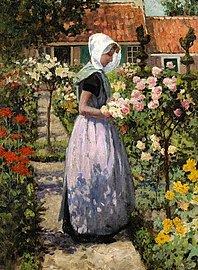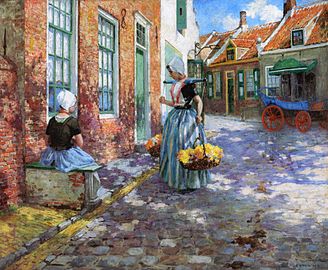George Hitchcock (artist)
You can help expand this article with text translated from the corresponding article in German. (November 2021) Click [show] for important translation instructions.
|
George Hitchcock | |
|---|---|
 Portrait by John Singer Sargent (1900) | |
| Born | September 29, 1850 |
| Died | August 2, 1913 (aged 62) Marken, Netherlands |
| Nationality | American |
| Education | Brown University, Harvard Law School, Académie Julian |
| Patron(s) | Gustave Boulanger, Jules-Joseph Lefebvre |
George Hitchcock (September 29, 1850 – August 2, 1913) was an American painter, born in Providence, Rhode Island, and was mostly active in Europe, notably in the Netherlands.
Biography
[edit]Hitchcock graduated from Brown University, and from Harvard Law School in 1874. Hitchcock began his formal art education at the Heatherley's School of Fine Art in London in 1879.[1] He then turned his attention to art and became a pupil of Gustave Boulanger and Jules-Joseph Lefebvre at the Académie Julian in Paris in 1882.[2][3]

He attracted notice in the Paris Salon of 1885 with his Tulip Growing, of a Dutch garden he painted in the Netherlands. For years he had a studio in that country near Egmond aan Zee,[3] where he started his "Art Summer School" that later resulted in a group of returning summer artists, including Gari Melchers, that informally became the Egmondse School (1890-1905).[1] He received these students and guests at his "Huis Schuylenburgh", a large estate in Egmond aan den Hoef.

He became a chevalier of the French Legion of Honour and a member of the Vienna Academy of Arts, the Munich Secession Society, and other art bodies, and is represented in the Dresden gallery, the imperial collection in Vienna, the Chicago Art Institute, and the Detroit Institute of Arts.[3] In 1909, he was elected to the National Academy of Design as an Associate Academician.
Hitchcock married Henrietta Walker Richardson on July 6, 1881. He divorced her on July 31, 1905, and nine days later married Cecil Jay,[4] a student at the Art Summer School who was thirty-three years his junior. The newlyweds moved to Paris, effectively ending the summer school.
At the time of his death in 1913, he was living in a houseboat in the harbor of Marken, Netherlands.[5][6]
Selected paintings
[edit]-
 Maternité (1889), Aberdeen Archives, Gallery & Museums Collection
Maternité (1889), Aberdeen Archives, Gallery & Museums Collection -
Dutch bride, c.1890
-
Dutch woman in a garden, c.1890
-
Bulb fields with windmill, c.1890
-
The Flight into Egypt, 1892, the Smithsonian Museum, Washington, D.C., 1892
-
Dutch Flower Girls
-
Calypso c.1906
References
[edit]- ^ a b Grant Wingate, Zenobia. "George Hitchcock". Caldwell Gallery Hudson.
- ^ George Hitchcock in the RKD
- ^ a b c Chisholm 1911.
- ^ David Bernard Dearinger; National Academy of Design (U.S.) (2004). Paintings and Sculpture in the Collection of the National Academy of Design: 1826–1925. Hudson Hills. ISBN 978-1-55595-029-3.
- ^ Victorian Web
- ^ "George Hitchcock Dead". The New York Times. Paris. August 5, 1913. p. 4. Retrieved April 11, 2020 – via Newspapers.com.
- This article incorporates text from a publication now in the public domain: Chisholm, Hugh, ed. (1911). "Hitchcock, George". Encyclopædia Britannica. Vol. 13 (11th ed.). Cambridge University Press. p. 533.
External links
[edit]![]() Media related to George Hitchcock at Wikimedia Commons
Media related to George Hitchcock at Wikimedia Commons
- 1850 births
- 1913 deaths
- Harvard Law School alumni
- 19th-century American painters
- 20th-century American painters
- American male painters
- Académie Julian alumni
- National Academy of Design associates
- Knights of the Legion of Honour
- Brown University alumni
- 19th-century American male artists
- 20th-century American male artists
- American emigrants to the Netherlands
- People from Egmond
- Artists from Providence, Rhode Island







